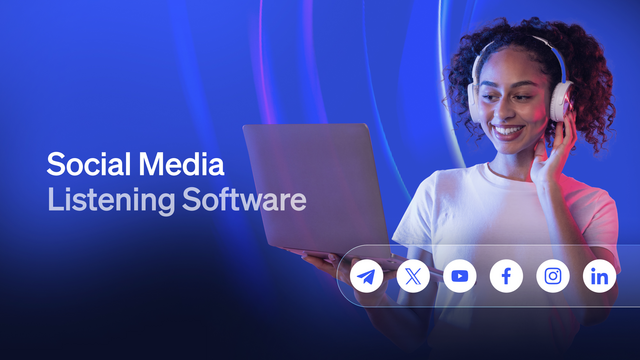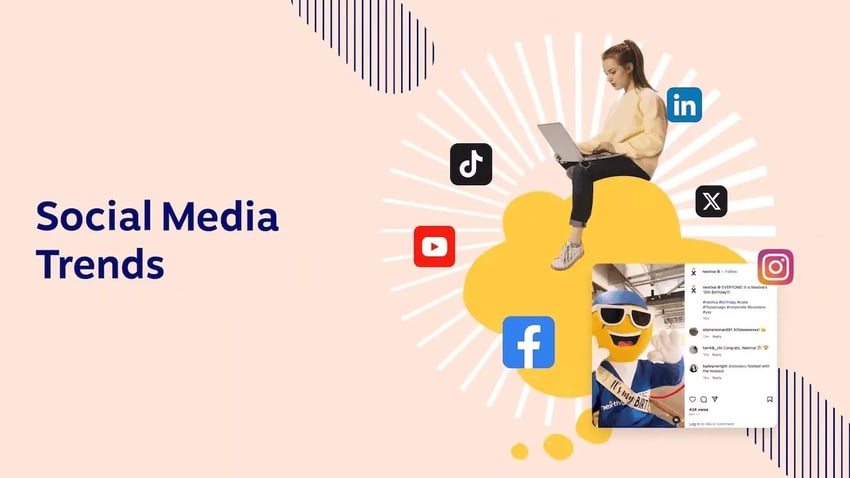Social media is where customers praise, complain, and decide whether to stick with your brand. But listening alone isn’t enough. According to Nextiva research, 56% of CX leaders plan to increase investment in social media as a customer engagement channel, making it a frontline experience, not just a marketing one.
Social media listening is how brands turn raw chatter into a real business advantage. It’s how Ben & Jerry’s knew people craved ice cream during rainstorms, leading to their hit Netflix & Chill’d flavor. They didn’t guess; they listened.
This guide cuts to the chase. We’ll break down the best social media listening tools on the market and show you how to choose the right one for your business, based on features, use cases, and CX impact.
Below is a quick list of the 10 best social media listening tools to get you started, plus three free options worth considering.
The 10 Best Social Media Listening Tools for 2026
- Nextiva – Best for unified customer experience (CX)
- Sprout Social – Best for enterprise teams
- Hootsuite – Best for social media managers
- Brandwatch – Best for consumer and market research
- Brand24 – Best for real-time brand monitoring and alerts
- Meltwater – Best for PR and comms teams
- BuzzSumo – Best for content marketers discovering trending topics
- Keyhole – Best for influencer marketing and campaign tracking
- Awario – Best for small businesses
- Talkwalker – Best for large enterprises and AI-powered insights
Before diving into the specific tools, let’s first glean some background on social media listening software.
What Are Social Media Listening Tools?
Social media listening tools are software platforms that automate the monitoring and analysis of online conversations surrounding your brand.
They use advanced technologies like AI and natural language processing (NLP) to scan social networks, blogs, news sites, and forums for specific keywords, topics, and brand mentions. Social media listening tools then turn this raw data into key customer insights, tracking metrics like customer sentiment, share of voice, and emerging trends, all in a single dashboard.
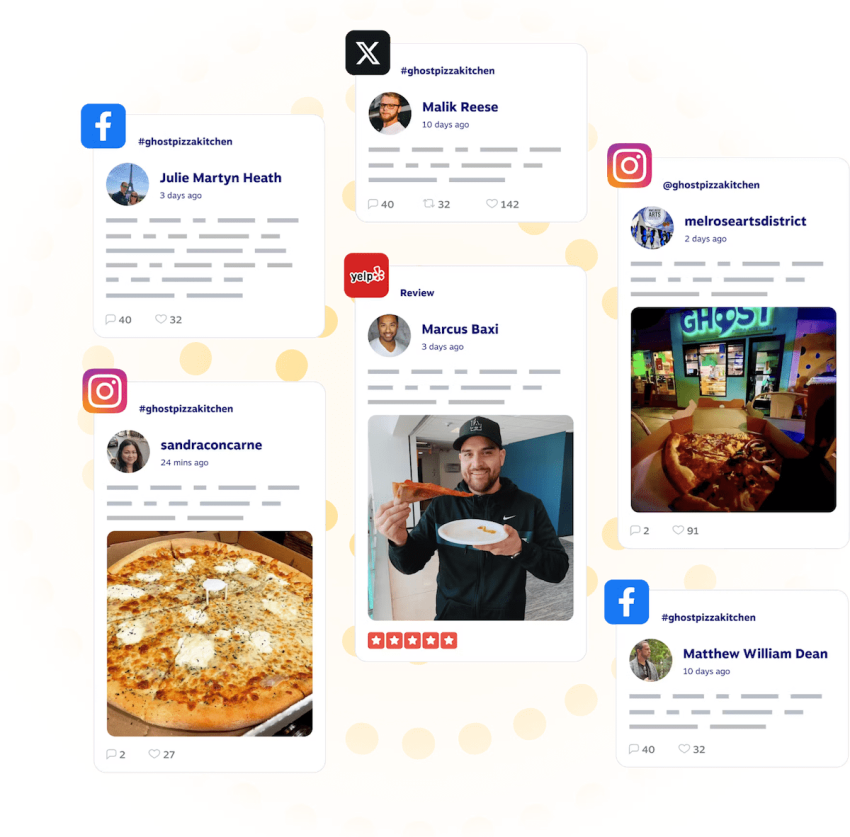
What Do Social Media Listening Tools Do?
Social media listening tools automate the tracking and analysis of online conversations, going beyond simple notifications. Here’s what they typically do:
Mentions and topics tracking
Social listening tools are a personalized filter for the entire internet. They monitor billions of online sources to capture social media conversations and mentions of specific keywords. Businesses get a complete overview of the conversations surrounding their brand, products, and industry, including:
- Your brand and product names (even without tags)
- Competitor names and campaigns
- Industry-specific hashtags and topics
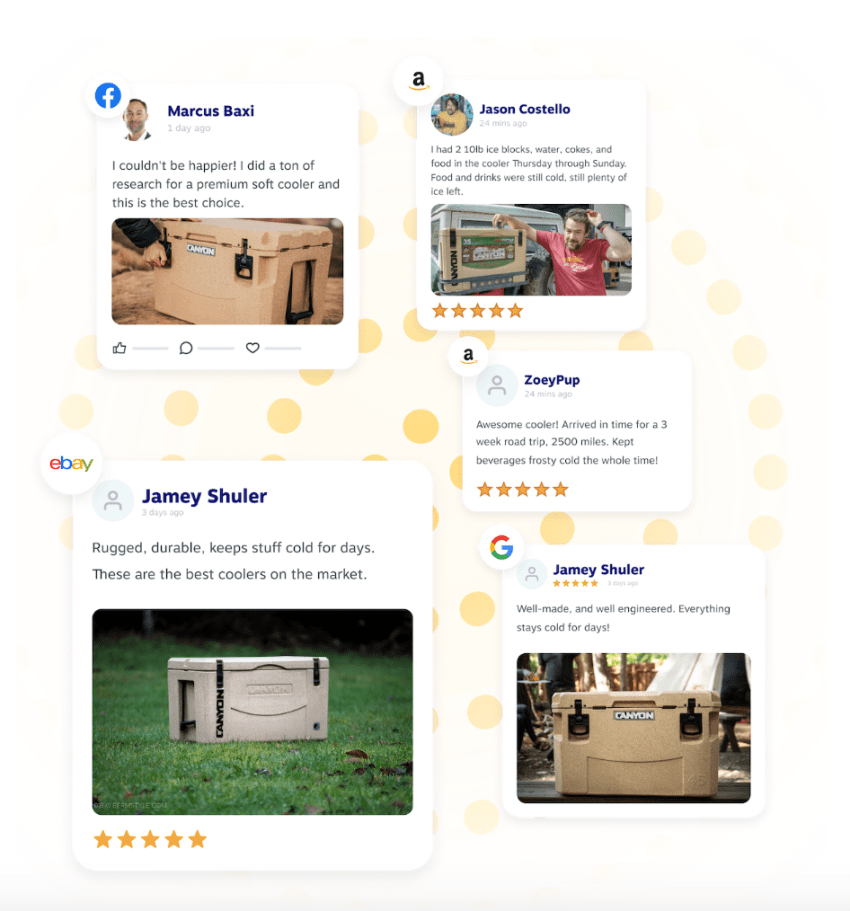
Customer sentiment analysis
Not all mentions are created equal. Social media listening tools use AI to analyze the emotional tone behind online posts and automatically categorize them as positive, negative, or neutral, so you can quickly understand public perception and prioritize responses.
Crisis detection
Businesses can set up real-time alerts for negative sentiment spikes or specific keywords. Social media tools work as an early warning system, helping you identify potential PR crises before they escalate and giving your team a decisive head start for effective social media management.
Competitive analysis
You get deep insights into your customers’ attitudes, opinions, and behaviors. Social listening software also allows you to compare your market share with that of your competitors and turn their perceived weaknesses into your advantages.
Trends identification
Social listening tools can easily analyze tons of conversation data, identify emerging social media trends before they become mainstream, and discover key influencers and thought leaders shaping the discourse in your niche.
Reporting and analytics
Finally, social listening tools transform massive amounts of data into easy-to-understand reports and dashboards. So you can visualize trends, track performance against key social media KPIs, and share insights company-wide without requiring a team of data analysts.

How Social Listening Tools Help Your Business
By connecting with the world’s largest focus group, you can gain a competitive advantage. Social listening tools offer tangible benefits throughout your business.
Deepen customer understanding and improve CX
57% of businesses use social listening primarily to understand their customers’ attitudes and opinions beyond simple demographics and to find out what their audience wants, what they struggle with, and what they love.
Tracking online conversations lets you quickly identify and address customer complaints or questions before they even contact your support team. This proactive engagement improves the customer experience and transforms potentially negative situations into opportunities for customer retention.
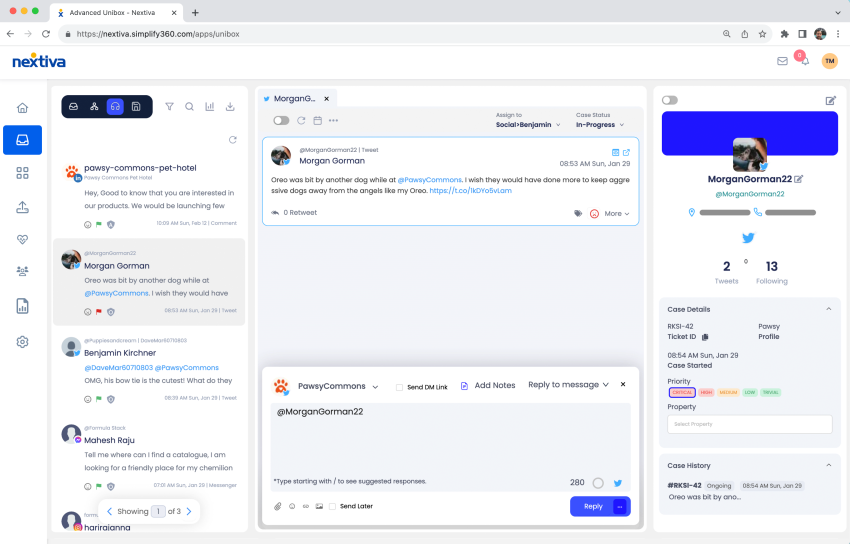
Improve your marketing and product strategy
With social media listening software, you can learn exactly what language your customers use when describing their problems or which features they’re most excited about to improve your marketing strategy. You can then create highly relevant ad copy, blog posts, and social media content that resonates with your target audience.
Identifying recurring feature requests or common frustrations also helps your product teams make data-driven decisions to improve your offering and drive innovation.
Monitor brand health and manage reputation
55% of businesses use social listening to monitor brand health and improve brand reputation because social listening tools provide a complete, real-time overview of your brand’s online perception. You can monitor sentiment over time, identify PR crises before they escalate, and capitalize on positive reviews and testimonials. This constant vigilance allows you to confidently protect and manage your brand’s reputation.
Discover new engagement opportunities and outperform competitors
Social listening tools are adept at identifying key influencers and brand ambassadors in your industry, paving the way for powerful collaborations. More directly, you can uncover new opportunities by identifying conversations from people actively searching for a product like yours or complaining about a competitor. You can track their campaigns, learn from their mistakes, and position your brand to win over dissatisfied customers.

Comparison of the Top Social Media Listening Tools
| Tool | Best for | Key feature | Starting price | Free trial/plan |
| Nextiva | All-in-one CX | Unified social management & listening | $15/user/month | Free demo |
| Sprout Social | Enterprise Teams | Premium analytics & publishing | $199/seat/month | 30-day trial |
| Hootsuite | Social Media Managers | All-in-one scheduler & listener | $99/user/month | 30-day trial |
| Brandwatch | In-depth research | Consumer intelligence platform | Contact sales for details | No |
| Brand24 | Real-time tracking | Instant mention alerts | $149/user/month | 14-day trial |
| Meltwater | PR & Comms Teams | Media intelligence & monitoring | Contact for details | Free demo |
| BuzzSumo | Content Marketers | Content & trend discovery | $199/user/month | 7-day trial |
| Keyhole | Influencer Marketing | Hashtag & campaign tracking | Request a custom quote | Request a demo |
| Awario | SMBs | Affordable non-stop monitoring | $29/month | 7-day trial |
| Talkwalker | Large enterprises | AI-powered analytics | Request a custom quote | Free demo |
Best Social Listening Tools for All-in-One Management
For teams that need a unified platform for their entire social media strategy, these all-in-one platforms are the solution. They go beyond simple listening by integrating publishing, engagement, and analytics into a streamlined workflow, eliminating the need to juggle multiple siloed tools.
1. Nextiva

Best for: Businesses that want to break down silos and integrate social listening directly into their CRM and customer support workflows.
Nextiva treats social listening not as a standalone task, but as a vital piece of the entire customer journey. It’s a social customer service platform that integrates social conversations directly into a complete communications platform, connecting your social media team with your sales and support departments. This approach moves you beyond listening to taking immediate, informed action on online conversations.
Key features:
- Unified social & review management: Manage conversations and reviews from Facebook, Instagram, Google, Yelp, TripAdvisor, and more, all from a single, intuitive inbox without switching between platforms.
- Integrated communications: Connects social media interactions with phone calls, SMS, and email for a complete 360-degree view of the customer journey.
- Social listening & tagging: Track brand mentions, create custom tags to organize keywords, and monitor content across channels to analyze trends and sentiment.
- AI-powered assistance: Use the AI-powered Customer Engagement Assist™ to auto-respond to posts and reviews based on sentiment and other criteria you determine.
- Intelligent routing: Automatically assign social media posts and reviews to specific team members based on custom rules, ensuring a fast and organized response.
- Scalable plans: Offers distinct plans for small businesses (Core and Engage) that bundle social media capabilities with broader communication tools, allowing the platform to grow with your needs.

Pros: Offers a complete, 360-degree view of the customer by unifying social media with other communication channels. Enables seamless handoffs from a social media comment to a formal support ticket.
Cons: May be more comprehensive than what a team needing only social listening requires, as features are part of a broader communications suite.
2. Sprout Social
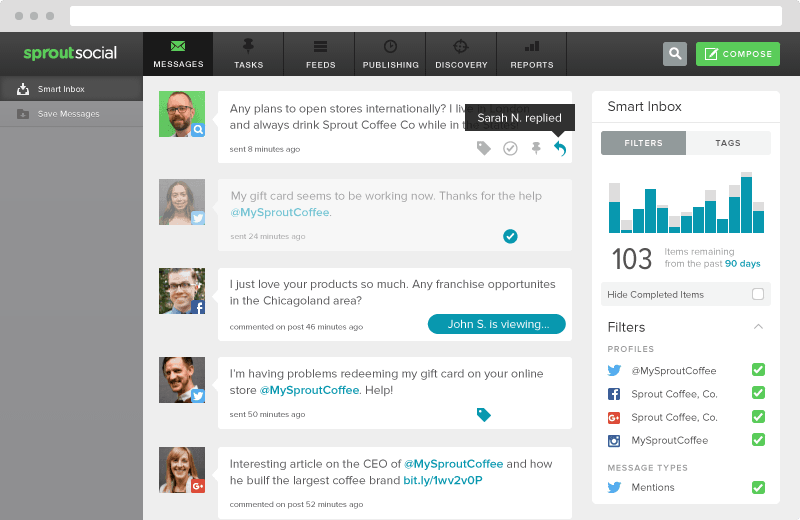
Best for: Enterprise and mid-market businesses that need a robust, user-friendly platform for all social media activities.
Sprout Social is a high-quality, sophisticated, all-in-one platform for social media teams that value performance and elegance. It combines publishing, engagement, listening, and analytics into one intuitive interface for managing your brand presence at scale.
Key features:
- Advanced listening: Build complex and precise queries to track brand sentiment, campaign performance, and industry trends without noise.
- Premium analytics: Generate beautiful, presentation-ready reports on everything from share of voice to competitor performance.
- Smart Inbox: Get a unified inbox that consolidates messages from all platforms, making engagement efficient and trackable.
Pros: The user interface is clean and easy to navigate. Reporting and analytics are both powerful and visually impressive. Strong collaboration tools for teams.
Cons: It comes with a high price tag. The most advanced listening features are part of an expensive add-on to their already premium plans.
3. Hootsuite
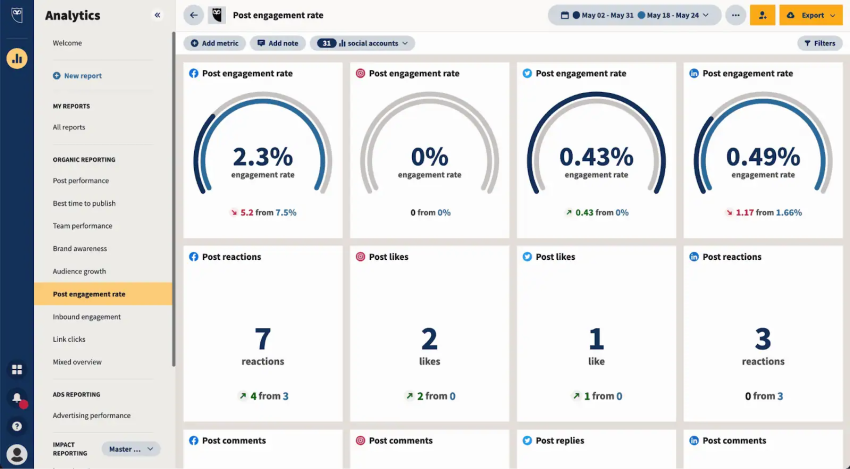
Best for: Social media managers and agencies responsible for juggling numerous social profiles across different brands.
As an industry veteran, Hootsuite is the go-to platform for easily managing a large number of social media profiles. Originally a scheduler, Hootsuite has evolved into a comprehensive management tool, now enhanced with advanced listening features through the acquisition of Talkwalker.
Key features:
- Customizable “Streams”: Monitor multiple keywords, hashtags, and mentions in a single, real-time dashboard view.
- Owly AI: An AI-powered assistant that helps generate captions and content ideas instantly.
- App Directory: A massive library of integrations that allows you to connect Hootsuite with tools like Slack, Mailchimp, and Dropbox.
Pros: Excels at managing a high volume of accounts. Its App Directory makes it highly customizable. It’s an established and reliable industry standard.
Cons: The user interface can feel dated or cluttered compared to newer platforms. The advanced listening features can feel less seamlessly integrated than native solutions.
Best Social Listening Tools for Deep Analytics & Research
When surface-level mention tracking isn’t enough, these platforms offer the opportunity for in-depth analytics. Designed for market researchers, PR agencies, and corporate brands, the tools in this category excel at providing consumer insights, competitive analysis, and tracking conversations across the media landscape — not just social media.
4. Brandwatch
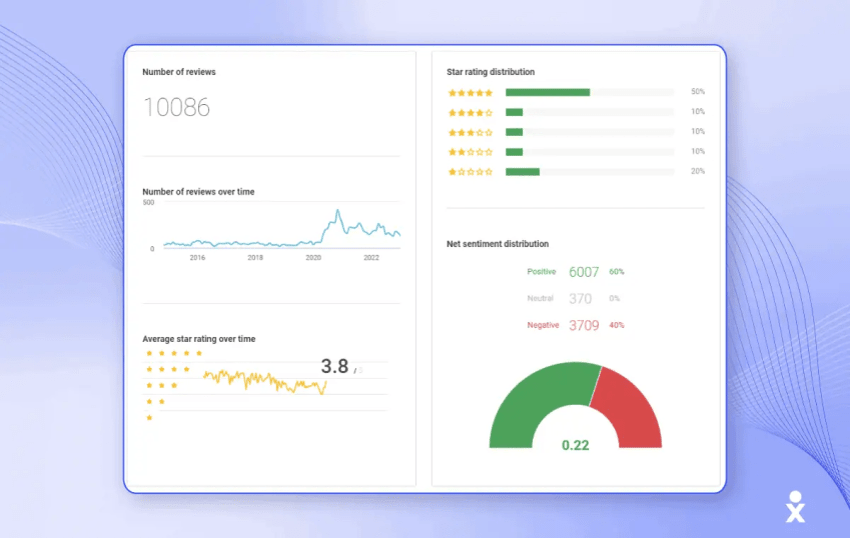
Best for: Market researchers and enterprise brands needing deep, historical consumer intelligence to predict trends and understand markets.
Brandwatch is a leading customer intelligence software. Market researchers and data analysts use this tool to conduct in-depth and comprehensive studies on consumer behavior. With access to a historical data archive of over 1.5 trillion online posts, Brandwatch provides deep consumer insights.
Key features:
- Historical data archive: Access and analyze online conversations dating back more than a decade.
- Iris™ AI Analyst: An AI assistant that automatically detects significant changes or spikes in conversation, alerting you to emerging trends.
- Image and Emoji analysis: Understand the full context of a conversation by analyzing visual content and emojis.
Pros: In-depth data and research capabilities. Flexible query-building allows for highly-specific research.
Cons: Quite expensive and has a steep learning curve, making it unsuitable for simple brand monitoring.
5. Brand24
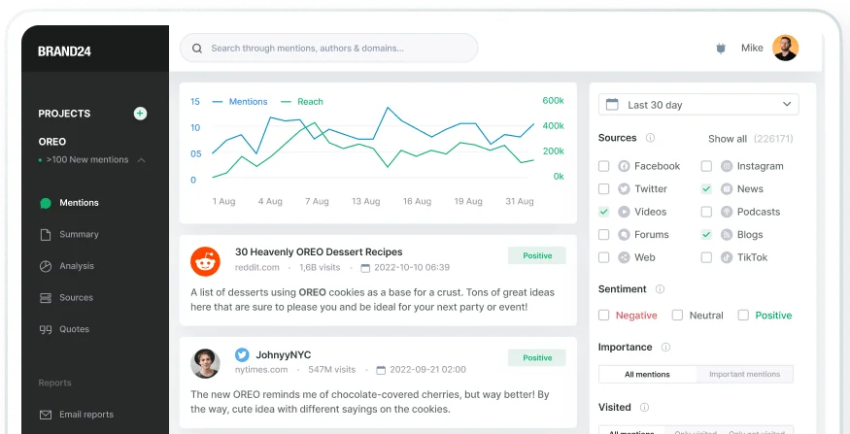
Best for: Businesses of all sizes that need immediate, real-time brand monitoring and alerts for PR management.
Brand24 is built for speed. As a digital watchdog, it delivers a real-time stream of mentions, ensuring you’re the first to know when your brand is being discussed online. It’s a great social listening tool for fast PR, reputation management, and real-time customer engagement.
Key features:
- Real-time mention alerts: Get instant notifications via email or the mobile app whenever your keywords are mentioned.
- Automated sentiment analysis: Automatically categorizes mentions as positive, negative, or neutral to help you prioritize responses.
- Influence Score: Identifies the most influential authors and sites talking about your brand, helping you find potential partners.
Pros: User-friendly and can be set up in minutes. The pricing is affordable and scalable. Excellent for catching and managing potential PR crises early.
Cons: Focus on real-time data makes its historical analysis capabilities less powerful. Basic analytics compared to enterprise-level tools.
6. Meltwater
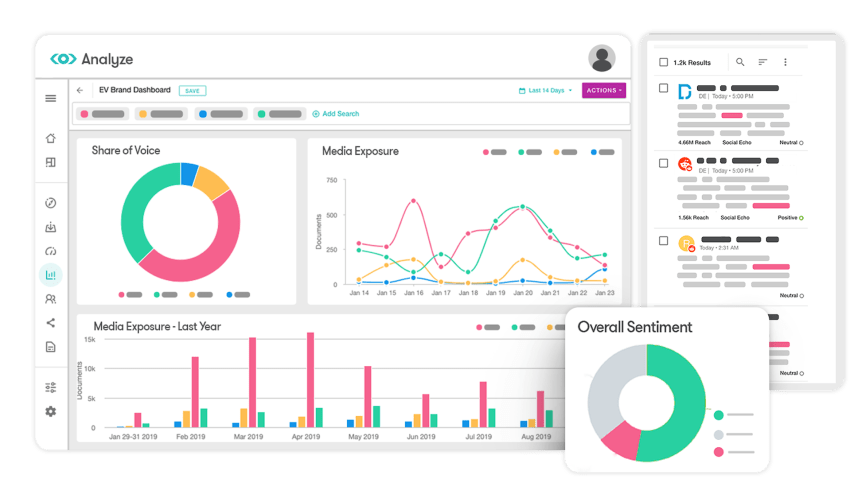
Best for: PR, corporate communications, and marketing teams focused on brand reputation across all forms of media.
Meltwater is the platform of choice for PR and communications professionals because it covers more than just social media. It provides a comprehensive overview of the entire media landscape, monitoring global news, print media, blogs, broadcast media, and social channels to capture the public perception of your brand.
Key features:
- Global media monitoring: The most comprehensive tracking available, covering online, print, broadcast, and social media sources.
- Journalist database & outreach tools: Find and connect with relevant journalists and media contacts directly within the platform.
- Executive alerts: Delivers high-level summaries and reports on brand health directly to key stakeholders.
Pros: Great media coverage and excellent tools for measuring the impact of PR campaigns and managing crisis communications.
Cons: It’s an enterprise-grade solution with enterprise-level pricing. The platform can be complex and is less focused on social media publishing features.
Best Social Listening Tools for Content & Influencer Marketing
This category covers the “who” and “what” of industry conversations. These specialized social listening platforms identify trending content, discover key influencers, and measure the precise impact of your campaigns. They provide the data you need to create engaging content and result-driven partnerships.
7. BuzzSumo
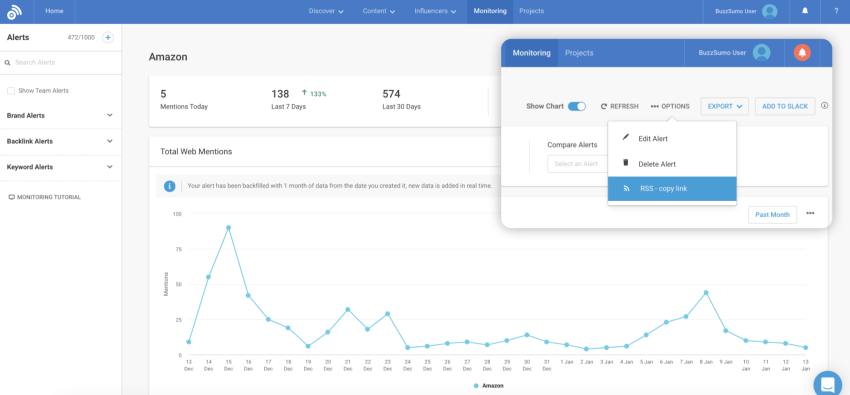
Best for: Content marketers, SEO specialists, and digital PR teams looking for data-driven content ideas and outreach opportunities.
BuzzSumo helps you answer the most important question in content marketing: “What really interests my target audience?” Instead of tracking what people are saying about your brand, it shows you what content is currently garnering attention in your niche, who’s sharing it, and what questions people are asking.
Key features:
- Content Discovery Engine: Enter any topic to see the most shared and linked-to articles across the web.
- Topic-based Influencer Finder: Identifies genuine thought leaders and creators based on the content they share, not just follower counts.
- Question Analyzer: Scours millions of forum posts from sites like Reddit and Quora to find the real questions your audience is asking.
Pros: Great for brainstorming, validating content ideas, and identifying trending topics before they peak. The interface is simple and effective.
Cons: It’s a specialized tool and not a traditional social listening platform; it lacks brand health and sentiment tracking for your own brand.
8. Keyhole
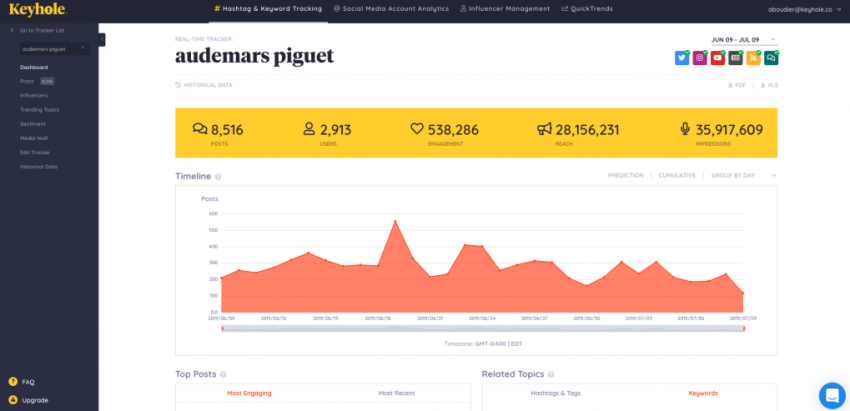
Best for: Marketers and agencies looking to track hashtags, events, and influencer marketing campaigns in real-time.
Keyhole is for marketers who live and breathe data and ROI. It specializes in precisely tracking and measuring the impact of social media campaigns, events, and influencer partnerships. It provides you with hard data that shows you the real value of your social media efforts to stakeholders.
Key features:
- Real-time hashtag & keyword tracking: Monitor the performance of your campaign hashtags across X (Twitter), Instagram, and more.
- Campaign monitoring dashboards: Create beautiful, shareable live dashboards perfect for displaying during events.
- Influencer tracking: Track the performance of specific influencers and measure their impact on your campaign.
Pros: Great for live event tracking and reporting. Provides clear, visually appealing data that is easy to understand. Perfect for proving campaign ROI.
Cons: It’s not designed for broad, “always-on” brand monitoring; its strength lies in tracking specific, time-bound campaigns.
Best Social Listening Tool for Small & Medium Businesses
You don’t need a large budget to get meaningful insights. Designed specifically for small and medium-sized businesses, this tool combines affordability and functionality. They deliver clear ROI through features like lead generation and nonstop monitoring, without the complexity or cost of higher-end platforms.
9. Awario
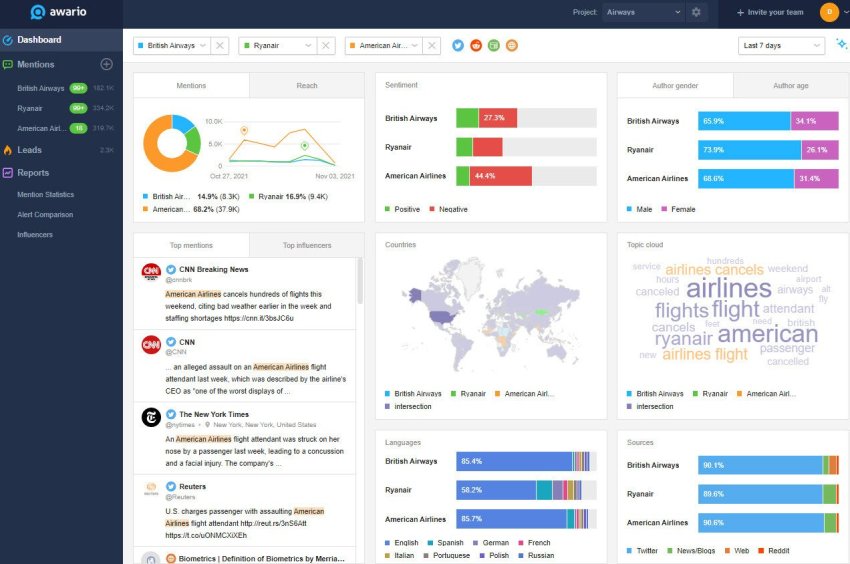
Awario offers powerful social listening capabilities without the high price tag for businesses. It enables continuous keyword monitoring across the web and social media, and its standout feature turns listening into a proactive sales tool.
Best for: Small and medium-sized businesses, startups, and agencies needing an affordable and effective listening tool.
Key features:
- Awario Leads: A unique feature that actively finds potential customers by identifying posts where users are asking for product recommendations or complaining about competitors.
- Non-stop monitoring: Continuously crawls the web for new mentions of your keywords.
- Boolean Search: Allows you to create specific and targeted search queries to filter out irrelevant noise.
Pros: The pricing is accessible for small businesses. The unique lead generation feature provides a clear and immediate ROI. It’s user-friendly and easy to get started with.
Cons: Its access to historical data is limited compared to enterprise tools. The analytics are powerful for the price, but not as deep as higher-tier platforms.
Best Social Listening Tool for AI-Powered Enterprise Insights
For global businesses that need to analyze conversations on a large scale, traditional listening isn’t enough. The following enterprise social listening software uses AI that can analyze not only text but also images and videos for brand logos and context.
10. Talkwalker
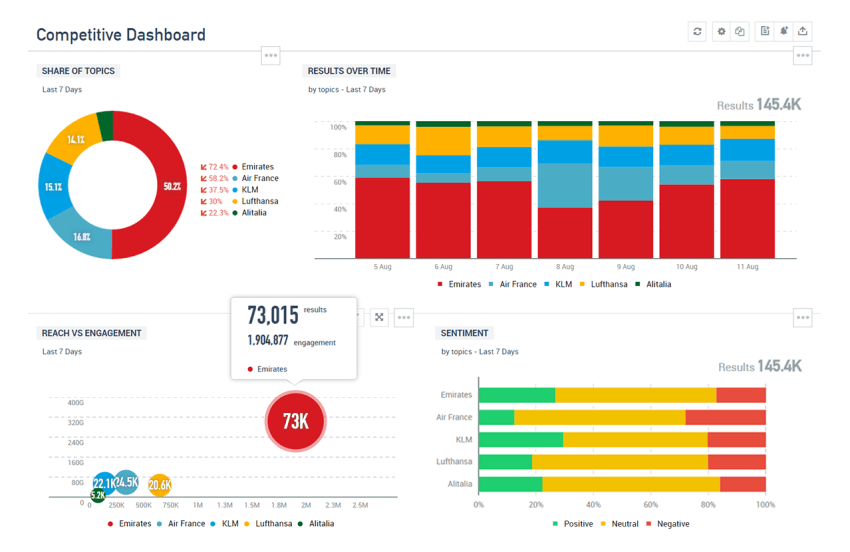
Note: While now part of Hootsuite, Talkwalker still operates as a powerful standalone entity for enterprise clients.
Best for: Large, global enterprises that require advanced AI analytics, image recognition, and predictive insights.
Talkwalker is an AI-powered enterprise listening engine that detects critical signals in the noise of global conversations. It provides a 360-degree view of brand perception by analyzing not only text but also images and video content.
Key features:
- Visual listening: Proprietary technology that can recognize your brand’s logo in images and videos, even when your name isn’t mentioned.
- AI-powered sentiment analysis: Analyzes text with high accuracy across multiple languages to understand the true sentiment of a conversation.
- Predictive analytics: Uses historical data to forecast trends and predict how campaigns might perform.
Pros: Great AI and visual listening capabilities. Incredible depth for analyzing customer feedback from reviews and surveys. Perfect for global brands that need multi-language analysis.
Cons: It’s a high-end, complex platform with a price tag to match. It can be overwhelming for teams that don’t have dedicated data analysts.
Best Free Social Media Listening Tools
Free tools can’t match the depth of every enterprise platform, but they’re a smart starting point for businesses on a budget. Here are three top social listening tools worth considering:
11. Google Alerts
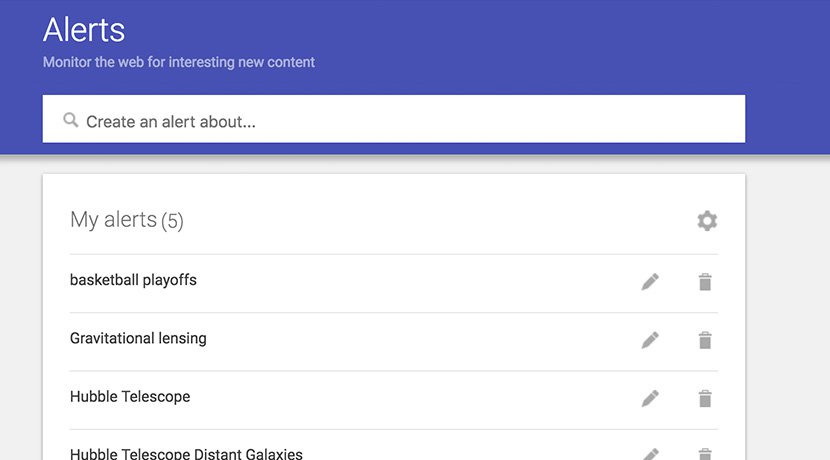
Best for: Small businesses and teams that want steady updates from blogs, forums, and news sites.
Google Alerts keeps you updated on new mentions of your brand, industry terms, or competitors across the web. You set your keywords, and the tool sends email notifications whenever relevant content appears online. It’s a simple way to track what’s most important without needing to check multiple social media platforms yourself.
Key features:
- Keyword monitoring: Track your brand, products, or competitors with custom search terms.
- Email notifications: Receive updates automatically whenever new content matches your keywords.
Pros: Easy to set up and use. Provides steady visibility into online conversations. Works well for tracking brand reputation and industry mentions.
Cons: Focuses on web content; does not cover most social media platforms.
12. Talkwalker Alerts
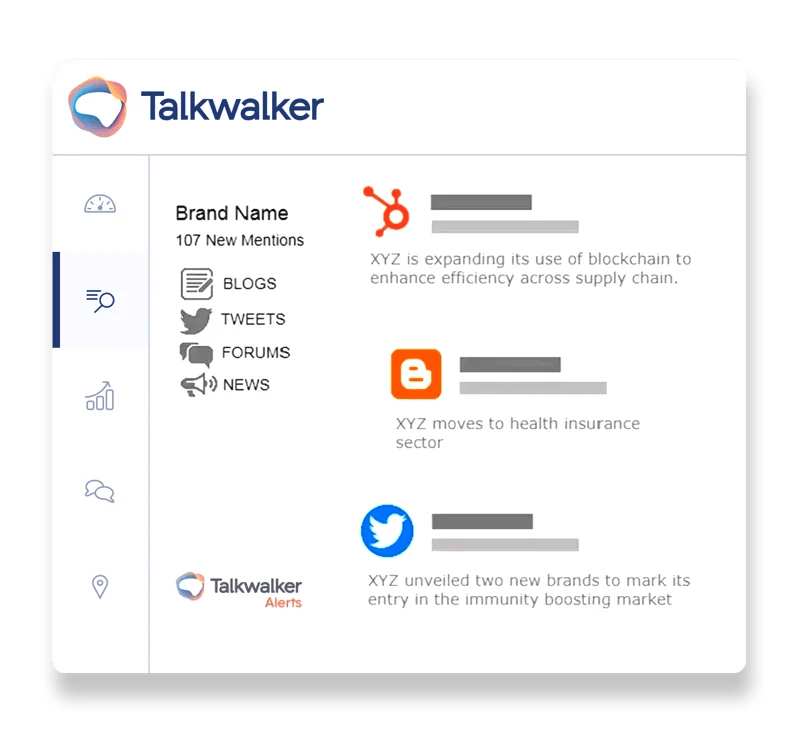
Best for: Teams that want timely, actionable insights from both news and social media without investing in paid software.
Talkwalker Alerts expands the scope by covering both news and social media channels. It provides a broader perspective than basic alerts to give your team a real-time view of fast-moving conversations about your brand or industry.
Key features:
- Real-time alerts: Receive notifications as soon as mentions occur online or on social media.
- Multi-source coverage: Combines web content and social media monitoring in one place.
Pros: Tracks online and social activity simultaneously. Helps teams spot trends and competitor mentions quickly. Offers actionable insights at no cost.
Cons: The Free plan has limits on the number of alerts and sources compared to paid versions.
13. X (Twitter) Advanced Search
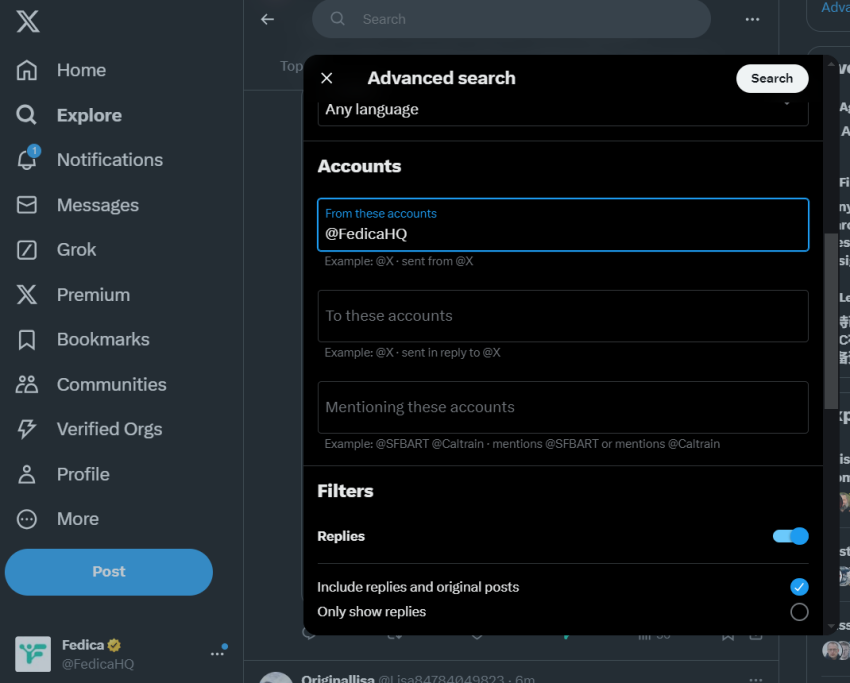
Best for: Businesses active on X that want detailed insights into conversations and trends.
X Advanced Search offers detailed filters for exploring conversations on the platform. You can search by keywords, hashtags, user accounts, or dates to zero in on the most relevant posts. This precision makes it a useful tool for spotting trends and engaging with specific audiences and using that knowledge to optimize their social media strategy, digital marketing, and the conversations happening across channels.
Key features:
- Filtered search: Narrow results by keywords, hashtags, accounts, or time frames.
- Sentiment tracking: Identify positive, neutral, or negative reactions using emojis or specific keywords.
Pros: Provides real-time insights and detailed results. Helps measure campaign reactions and track audience sentiment. Flexible and free to use.
Cons: Only monitors conversations within X; doesn’t include other social platforms or web content.
Key Features To Look for in Social Listening Tools
While every platform is different, the best social listening tools offer some key features across the board:
- Smart Inbox: A smart or unified inbox centralizes all your messages, mentions, and comments from different social networks into a unified feed. Your team doesn’t switch between platforms and doesn’t miss customer interactions.
- Real-time notifications: Real-time notifications immediately inform you of important changes, such as a sudden spike in negative mentions or the mention of a key influencer. It works best in crisis management and seizing current opportunities.
- Trend reports and analytics: Social media analytics automatically identify the most popular hashtags, latest topics, and most prominent personalities associated with your brand, simplifying the creation of relevant content and keeping you one step ahead.
- Competitive benchmarking: Benchmarking lets you formally track your performance relative to other brands and compare metrics like share of voice, sentiment, and engagement rates to determine your market position and identify your competitors’ strengths and weaknesses.
- AI and natural language processing (NLP): AI and NLP capabilities enable social listening tools to understand complex human language, slang, and sarcasm. They provide more precise sentiment analysis and can identify nuanced topics in thousands of customer conversations.
- Automated reporting: Social media automation, such as customizable dashboards, helps you automatically generate and email weekly, monthly, or quarterly reports on your key metrics and track your progress.
How To Choose the Right Social Listening Tool for Your Business
Picking the right tool depends on how you plan to use it and what resources you have available. A structured approach makes the choice easier.
1) Set clear goals
Decide what you want to achieve with social listening. If your priority is brand awareness or monitoring your social media presence, choose platforms that capture wide coverage and track sentiment. For lead generation, select tools that highlight individual mentions you can act on to optimize your social media marketing.
If you focus on competitive analysis, look for platforms that track rival brands and industry trends in detail. Your goals determine which features, from actionable insights to real-time insights, will bring the most benefit. A solid marketing strategy always starts with clear objectives.
2) Decide on a budget
Social listening tools vary in cost. Free options like Google Alerts and Talkwalker Alerts cover basic monitoring. Entry-level paid plans usually start around $100 to $200 per month. Platforms with advanced analytics, data visualization, multi-team support, or automation can cost several thousand dollars monthly. Setting a clear budget helps you invest only in the features and functionality your team needs.
3) Review the key features
Many features differ across platforms, so observe the features that support your goals. Sentiment analysis helps you understand how audiences feel about your brand. Influencer identification shows who drives relevant conversations. Reporting tools allow you to share valuable insights with leadership quickly.
Focus on features that solve your team’s specific needs, whether it’s improving brand performance, addressing pain points, or enhancing customer care, rather than getting distracted by extras.
4) Check the integration options
Social listening platforms deliver better results when they connect smoothly with the systems you already use. Integrations with CRM platforms, help desks, or marketing automation software save time and ensure data flows into your existing workflow. For example, tying listening data into a CRM allows sales teams to act on leads immediately.
5) Test usability and support
Even the most powerful platforms don’t help if your team can’t use them properly. Test how intuitive the interface is and what training resources or support channels the vendor provides. Live chat, onboarding sessions, and a knowledge base help teams learn the tool quickly and cut training time.
Scale Social Support and Take Action With Nextiva
If you only use social media to broadcast your messages, you’re doing it wrong. Social listening allows you and your team to tap into and understand the online conversation surrounding your brand.
Adopt social listening for your business, and you’ll be able to anticipate the needs of your target audience, forge stronger relationships with customers, improve your brand reputation, and make data-driven decisions that lead to supercharged business outcomes.
Listen and take action with Nextiva’s Social Media Management platform. Whether you’re a small business owner managing your social media solo or a social media director overseeing a large team, our unbeatable listening features, unified management tools, and AI-powered analytics deliver game-changing results.
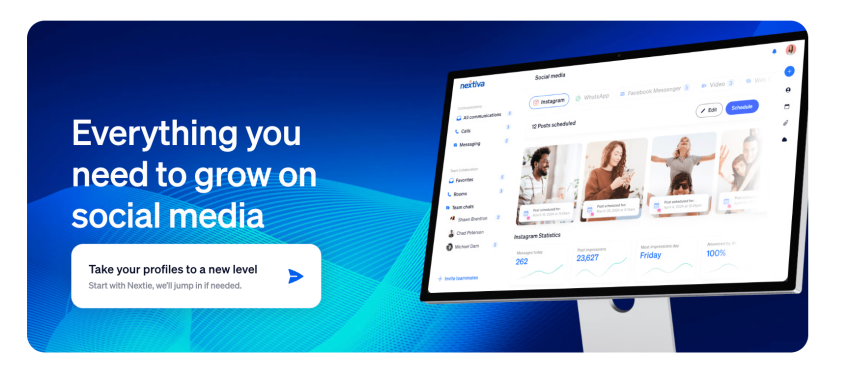
💫 Take a quantum leap forward with Nextiva and achieve a sustainable competitive advantage. Click here for a free, personalized, live demo to discover how!
FAQs
Social media listening is the process of monitoring online conversations to understand what people are saying about your brand, industry, and competitors, and then analyzing that data to inform your business strategy.
Costs vary widely. Tools for small businesses can start around $39/month, while mid-tier platforms are typically $100-$500/month. Enterprise-level solutions with advanced analytics can cost thousands of dollars per month.
Absolutely. By monitoring for brand mentions and keywords related to customer issues, support teams can proactively find and resolve problems, often before the customer even contacts them directly.
Social monitoring is about collecting data and tracking individual mentions (the “what”). Social listening is about analyzing the sentiment and trends within that data to understand the bigger picture (the “why”).
The two biggest challenges are choosing the right tool and handling the data itself. Choosing a platform that doesn’t fit your budget or goals can be a costly mistake. Also, managing the vast amount of online data and dealing with inaccuracies (such as spam, bots, and sarcasm) is a constant hurdle.
Combine strategy and technology to reliable insights. First, create a clear plan to avoid data overload by focusing only on the most relevant keywords. Second, use a tool with good filters and an intuitive dashboard to filter through the noise. It’s also important to view data as a source of directional trends rather than perfect, absolute numbers.


















 Marketing & Sales
Marketing & Sales 